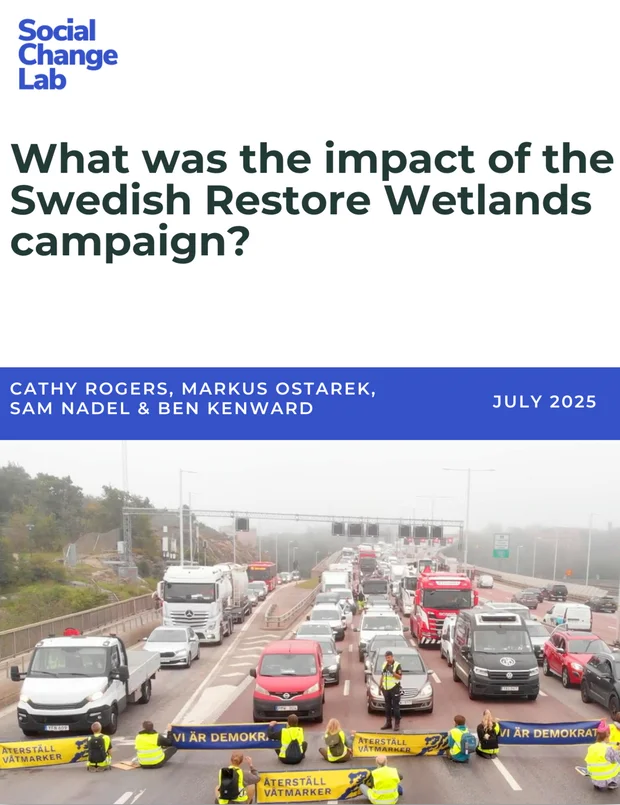The Social Change Lab conducts empirical research on the strategies and tactics of social movements. The institute studies the impact of protest movements on public opinion, public discourse and politics. The analysis has included interviews with representatives from Restore Wetlands, researchers, wetland experts, other major climate and environmental movements in Sweden, and politicians from all parties except the Liberals.
The results show several successes for Restore Wetlands. The analysis also shows that deeply unpopular tactics such as blocking motorways and disrupting popular live programmes or sporting events can drive meaningful social change when used with clear messages, specific demands and realistic expectations.
The report states that between March 2022 and April 2024, the Restore Wetlands campaign successfully transformed a relatively unknown climate and environmental issue into a national one through strategic civil disobedience. The campaign used high-profile, disruptive tactics and achieved significant success in setting the agenda, despite public disapproval of their methods.
Interviews reveal that MPs across party lines recognised the political influence of the campaign, even when they were reluctant to directly give credit to activists. One right-wing MP noted:
"I felt very negative about the strategy...But I must say they were not wrong. And it has also led us and our government to decide to allocate money for wetland restoration."
The Social Change Lab analysis found no evidence of increased support for anti-climate parties, contradicting common fears of backlash from disruptive protests.
- We now have confirmation of what we've known all along - radical disruptive climate activism is what's needed. You have to sit on the motorway. You have to disrupt popular TV shows and run into football matches. We knew we would be hated by many but you have to ask yourself the question: What is really important to you? Then you have to act proportionately and only do what is necessary," says Helen Wahlgren, spokesperson and founder of Restore Wetlands.
The Social Change Lab identifies a number of successes for Restore Wetlands.
- Media attention
The campaign received significant media coverage.
Mentions of "wetlands" in the media increased by 84% during the various protest periods.
in 2022, mentions doubled and in 2023 they tripled.
Over 95% of media coverage maintained a neutral stance on wetlands, suggesting that journalists used Restore Wetlands' protest tactics as hooks to discuss the issue. Public recognition of the campaign and opinion formation:
Within 8 months, Restore Wetlands received 61% name recognition among adult Swedes.
Although 70% of the public did not consider their tactics justified, 75% now considered it important to restore drained wetlands.
This suggests successful differentiation between methods and messages.- Parliamentary influence:
The political discourse also changed.
Mentions of wetlands in Parliament doubled during the campaign years compared to the baseline period. MPs from across the political spectrum recognised Restore Wetlands' role in raising wetlands on the political agenda despite criticism of the campaign's tactics. - Impact on voting intentions:
Despite unpopular strategies, the Restore Wetlands campaign influenced more voters to support climate advocacy parties by 0.79 percentage points. - Impacts on the broader sector:
Interviews with environmental organisations, academics and industry representatives suggested that established environmental groups were able to ride the wave of attention generated by Restore Wetlands to promote their own work in the field. - Limited but meaningful policy outcomes:
While the campaign took place during a period of overall budget cuts to climate action under Sweden's centre-right government, wetlands remained relatively protected.
The government allocated SEK 765 million until 2030 for wetland restoration, although some funding represented reallocation rather than new investment.
- Above all, this is an incredible acknowledgement to all those who have acted with courage and love with Restore Wetlands. This is a recognition to all those who have made and continue to make great sacrifices. Many have chosen and continue to risk imprisonment to draw attention to climate collapse and create change. This is your day," says Helen Wahlgren.
The Social Change Lab's research findings are published in The Guardian, Deutsche Welle, Vox and Nature Sustainability, as well as on the organisation's own website.
- "We don't have time to celebrate now, but after our actions at Grimsås bog this summer - that's when the champagne will arrive. Now we're going to dig up the ditches and stop the Finnish fossil fuel company Neova from destroying our Swedish bogs. And with the report behind us, we will continue with our strategies: persistent disruptive actions, day after day, until Neova is evicted," concludes Helen Wahlgren.

